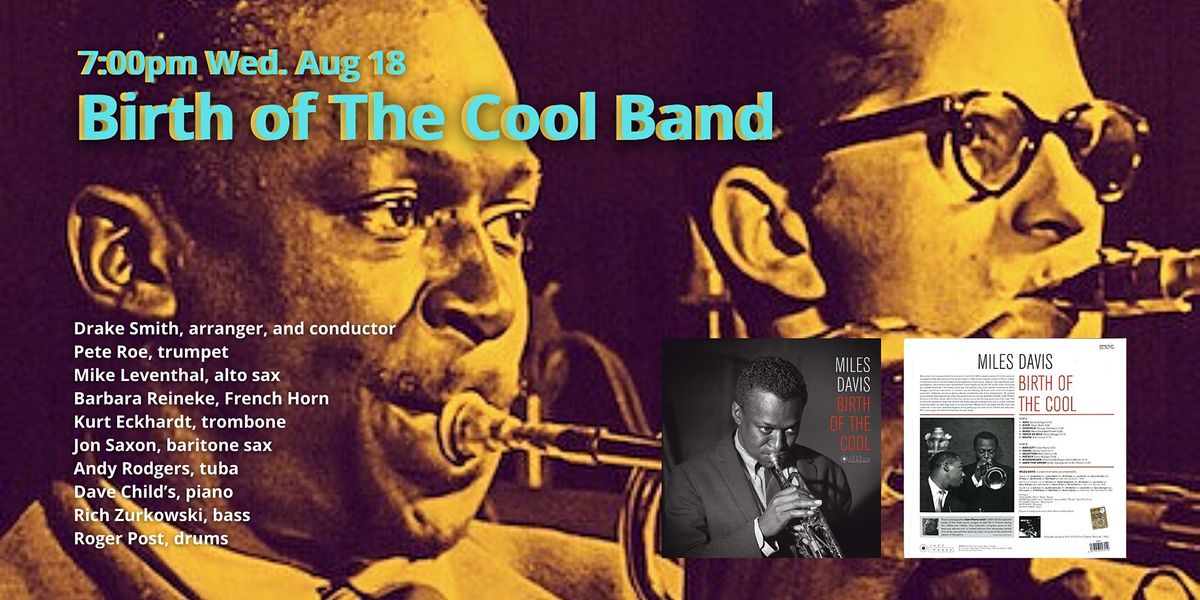Birth of The Cool BIG Band Performs The Miles Davis Album 7pm Wed Aug 18
Schedule
Wed Aug 18 2021 at 07:00 pm to 09:30 pm
Location
La Zingara | Bethel, CT

About this Event
Seating Chart
Safe Social Distancing Seating With Very Limited Ticket Availability. Tickets Are Sold As Single Seats With Communal Seating And By The Table. Tables seating 2 - 4 guests, with tables for 6 -8 available upon request. See The Attached Seating Chart. Indoor Tables With Open French Doors Facing The Performance And Outdoor Tables Are Available. Rain dates will be announced for a Thursday or Sunday. Admission Is Still Only $15.00 Per Person with open seating options available or as Tables Of Two = $30., Four = $60., Six = $90., and Eight = $120
About "Birth of The Cool"
Arranger Drake Smith conducts a 9 pc. band, performing the Miles Davis: Birth of The Cool album with drummer and music dir. Roger Post
Birth of the Cool is a compilation album by American jazz musician Miles Davis, released in February or March 1957 on Capitol Records. It compiles eleven tracks recorded by Davis's nonet for the label over the course of three sessions during 1949 and 1950.
Featuring unusual instrumentation and several notable musicians, the music consisted of innovative arrangements influenced by classical music techniques such as polyphony, and marked a major development in post-bebop jazz. As the title suggests, these recordings are considered seminal in the history of cool jazz. Most of them were originally released in the 10-inch 78-rpm format and are all approximately three minutes long.
From 1944 to 1948, Miles Davis played in Charlie Parker's quintet. Davis recorded several albums worth of material with Parker during this period, including Parker's Sessions for the Savoy and Dial labels. Davis' first records released under his own name were recorded with Parker's band, in 1947, and were more arranged and rehearsed than Parker's usual approach to recording. By 1948, Davis had three years of bebop playing under his belt, but he struggled to match the speed and ranges of the likes of Gillespie and Parker, choosing instead to play in the mid-range of his instrument.[6] In 1948, Davis, becoming increasingly concerned about growing tensions within the Parker quintet, left the group and began looking for a new band to work with.
At the same time, arranger Gil Evans began hosting gatherings of like-minded, forward-looking musicians at his small basement apartment, located on 55th Street in Manhattan, three blocks away from the jazz nightclubs of 52nd Street. Evans had gained a reputation in the jazz world for his orchestration of bebop tunes for the Claude Thornhill Orchestra in the mid-1940s. Keeping an open door policy, Evans' apartment came to host many of the young jazz artists of late-1940s New York. The participants engaged in discussions about the future of jazz, including a proposed group with a new sound. According to jazz historian Ted Gioia:
The participants were developing a range of tools that would change the sound of contemporary music. In their work together, they relied on a rich palette of harmonies, many of them drawn from European impressionist composers. They explored new instrumental textures, preferring to blend the voices of the horns like a choir rather than pit them against each other as the big bands had traditionally done with their thrusting and parrying sections. They brought down the tempos of their music ... they adopted a more lyrical approach to improvisation ...
The nonet recorded twelve tracks for Capitol during three sessions over the course of nearly a year and a half. Davis, Konitz, Mulligan and Barber were the only musicians who played on all three sessions, though the instrumental lineup was constant (excepting the omission of piano on a few songs and the addition of Hagood on "Darn That Dream"). The first session occurred on January 21, 1949, recording four tracks: Mulligan's "Jeru" and "Godchild" as well as Lewis's "Move" and "Budo". Jazz critic Richard Cook hypothesizes that Capitol, wanting to get a good start, recorded these numbers first because they were the most catchy tunes in the nonet's small repertoire.[10] That date Kai Winding replaced Zwerin on trombone, Al Haig replaced Lewis on piano, and Joe Shulman replaced McKibbon on bass.
The second recording date came three months later on April 22, 1949, with Davis filling in for Fats Navarro in Tadd Dameron's band with Charlie Parker during the interim. The band returned to the studio with five substitutions in personnel: J. J. Johnson on trombone, Sandy Siegelstein on French horn, Nelson Boyd on bass, and Kenny Clarke on drums, and John Lewis returning to the piano. At this session, the nonet recorded Mulligan's "Venus de Milo", Lewis's "Rouge", Carisi's "Israel", and "Boplicity", a collaboration between Davis and Evans, credited to the pseudonym "Cleo Henry".
The band did not return to the studio again until March 9, 1950. Davis did not call the band for any rehearsals or live performances between the second and third recording dates. The March 1950 date featured Mulligan's "Darn That Dream", "Rocker", and "Deception", and Evans's arrangement of Chummy MacGregor's "Moon Dreams", which had been released in a jazz arrangement by Glenn Miller and the AAF Band in 1944 on V-Disc. The band saw more substitutions, with Gunther Schuller on French horn and Al McKibbon on bass. Kenny Hagood returned for vocals on "Darn That Dream".
One of the features of the Davis Nonet was the use of paired instrumentation. An example of this can be heard on the John Lewis arrangement "Move". In "Move", Lewis gives the melody to the pairing of trumpet and alto saxophone, baritone saxophone and tuba supply counterpoint, and trombone and French horn provide harmonies. Gerry Mulligan's "Jeru" demonstrates another Nonet hallmark: the use of a unison sound and rich harmony throughout the horns. Davis said, "I wanted the instruments to sound like human voices singing ... and they did." Though the album is seen as a departure from traditional bop, the recordings do feature tunes that are considered close to the bop style, such as "Budo" which has the band bookending solos by Davis, Mulligan, Konitz, and Winding, similar to a bebop head arrangement.
The tracks from the January 1949 session were released soon after recording as two pairs of singles. From the April 1949 date, "Israel" and "Boplicity" were doubled together on a 78 and released as well. Of the twelve tracks recorded, Capitol released relatively few. In 1954, after persuasion from Rugolo, Capitol released eight of the tracks on a 10" record titled Classics in Jazz—Miles Davis (H-459). In 1957 eleven of the tracks (all except for "Darn That Dream") were released by Capitol as Birth of the Cool. The final track, "Darn That Dream" (the only song with vocals, by Hagood), was included with the other eleven on a 1972 LP Capitol Jazz Classics, Vol. 1: The Complete Birth Of The Cool (M-11026). Subsequent releases have been based on this last arrangement. The album has since been reissued many times in various formats. The recordings of the nonet from its time at the Royal Roost were released as Cool Boppin. In 1998, Capitol Records released The Complete Birth of the Cool, which was remastered by Mark Levinson and collected the nonet's live and studio tracks onto a single CD.
Note from the 2000 Capitol CD reissue producer Michael Cuscuna:
All previous reissues of this material have been derived from the 1957 12-inch LP master, which turns out to be second or third generation. The original tapes of each tune were filed individually and sound considerably better. Rudy Van Gelder returned to these masters, transferred them from 24-bit to digital, and worked his sonic magic. The result is a clearer and more present sound than ever before on these classic recordings.
Band Members:
Drake Smith, arranger, and conductor
Pete Roe, trumpet
Mike Leventhal, alto sax
Barbara Reineke, French Horn
Kurt Eckhardt, trombone
Jon Saxon, baritone sax
Andy Rodgers, tuba
Dave Child’s, piano
Rich Zurkowski, bass
Roger Post, drums
We're sorry, there are no refunds after tickets have been purchased. In the event of rain or other forms of weather which prohibits an outdoor performance, the rain date performance will be held on the Sunday of that week. If the rain date becomes postponed because of weather, a future alternate weather date will be picked.
Where is it happening?
La Zingara, 8 P T Barnum Square, Bethel, United StatesEvent Location & Nearby Stays:
USD 30.00 to USD 90.00
